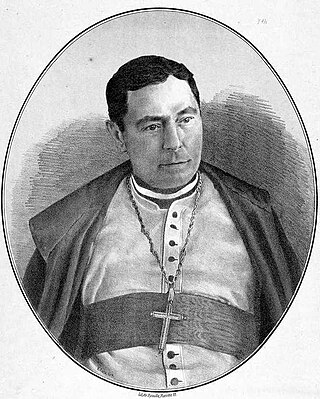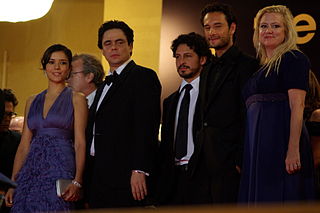
Lucía Leticia Méndez Pérez is a Mexican telenovela and film actress, top model and singer. Méndez was born in León, Guanajuato, Mexico.

The Spanish language employs a wide range of swear words that vary between Spanish speaking nations and in regions and subcultures of each nation. Idiomatic expressions, particularly profanity, are not always directly translatable into other languages, and so most of the English translations offered in this article are very rough and most likely do not reflect the full meaning of the expression they intend to translate.[c]
Canarian cuisine refers to the typical dishes and ingredients in the cuisine of the Canary Islands, and it constitutes an important element in the culture of its inhabitants. Its main features are the freshness, variety, simplicity, and richness of its ingredients, the mix of seafood and meat dishes, its cultural influences and the low knowledge of it by the rest of the world. Canarian cuisine is influenced by other cultures, especially that of the aboriginal inhabitants of the islands (Guanches), and has influenced Latin American cuisine.
Maria Luisa Puga was a Mexican writer. Her 1983 novel Pánico o peligro won the Xavier Villaurrutia Award.

"The pot calling the kettle black" is a proverbial idiom that may be of Spanish origin, of which English versions began to appear in the first half of the 17th century. It means a situation in which somebody accuses someone else of a fault which the accuser shares, and therefore is an example of psychological projection, or hypocrisy. Use of the expression to discredit or deflect a claim of wrongdoing by attacking the originator of the claim for their own similar behaviour is the tu quoque logical fallacy.
Paolo Agazzi Sacchini is an Italian film director. He has resided in Bolivia since 1975. He studied political science and economics in the State University of Milan as well as directing and writing at Superior Institute of Cinematography in Milan. He was born in Motta Baluffi.
José Hernández was a Spanish painter and plastic artist.

Zeferino González was a Spanish Dominican theologian, and philosopher, Archbishop of Seville and cardinal.

Being between Scylla and Charybdis is an idiom deriving from Greek mythology, which has been associated with the proverbial advice "to choose the lesser of two evils". Several other idioms, such as "on the horns of a dilemma", "between the devil and the deep blue sea", and "between a rock and a hard place" express similar meanings. The mythical situation also developed a proverbial use in which seeking to choose between equally dangerous extremes is seen as leading inevitably to disaster.

The Milkmaid and Her Pail is a folktale of Aarne-Thompson-Uther type 1430 about interrupted daydreams of wealth and fame. Ancient tales of this type exist in the East but Western variants are not found before the Middle Ages. It was only in the 18th century that the story about the daydreaming milkmaid began to be attributed to Aesop, although it was included in none of the main collections and does not appear in the Perry Index. In more recent times, the fable has been variously treated by artists and set by musicians.

Cristian Mercado is a Bolivian theater and film actor.

Cuban Sign Language, is the language used by the Deaf community in Cuba. There are approximately 19,000 users of the language. Cuban Sign Language is an important part of the culture of the Deaf community in Cuba.
Carles Mas Bacardit is a Spanish professional footballer who plays as a centre-back for Olot.

TechnoCalyps is a 2006 Belgian transhumanism documentary film written and directed by Frank Theys. It explores the advance of technology.

Dolors Bassa i Coll is an educator, psychopedagogist and Spanish politician from Catalonia who held the position of Minister of Labour, Social Affairs and Families in the Generalitat de Catalunya until Spain dismissed the Catalan government on 27 October 2017. She is known for her syndicalist career in the major Spanish trade union, Unión General de Trabajadores. Since March 2018 she was remanded in custody, without bail, by order of the Supreme Court of Spain, accused of sedition and rebellion. She was sentenced on October 14, 2019, to 12 years in prison for sedition, as being responsible for devoting several thousand public schools as polling stations in the 1 October 2017 referendum. She was freed in June 2021 following a government pardon.
Olin Pierre Louis is a Haitian Roman Catholic priest in San Juan, Puerto Rico. Louis was named the parish priest of la iglesia Nuestra Señora de la Providencia in San Juan by Roberto González Nieves, the leader of the Roman Catholic Church in Puerto Rico. Pierre Louis is known for providing support and advocating for Haitian and Dominican immigrants in Puerto Rico.
Edgar Smith is a Dominican author and poet born in Villa Consuelo, a neighborhood in the capital city of Santo Domingo. He is the eldest child of Juana I. Fernández and Ramón Smith, a member of the International Taekwon-Do Federation Hall of Fame. He is a poet, writer, editor and translator, who runs his own small publishing company, Books & Smith, in New York City, where he has resided since 2010.

When have we eaten from the same dish? is a Spanish idiom about someone who has "taken too many liberties" and caused irritation or offense. It is usually made as hierarchical social commentary about poor manners or incivility, said to someone perceived to be acting above their social standing, position, class or rank. It is also used as a statement, When we have eaten from the same dish.
Alberto Gallego Laencuentra is a Spanish retired footballer who played as a midfielder, and a manager.











